Yi Jing Hexagram 4 - Line 5
The hexagram: 4
An hexagram is a combination of six yin and yang lines.

4.5 (4 > 59) - THE MĂNG HEXAGRAM
The fifth line, divided, shows its subject as a simple lad without experience. There will be good fortune.
Bing DeepL Google Yandex4.5 (4 > 59) - Meng, la stupidité juvénile
Meng : Intelligence non encore développée ; être non encore formé.
L’ignorant, tout jeune encore, peut arriver à bien (être instruit).
Le bien de son état est la docilité, la douceur.
The trigrams
The trigrams are combinations of three yin and yang lines. The three bottom lines of the hexagram form the lower trigram and represent the inner situation. The three top lines form the upper trigram and represent the outer situation.
trigSup2


trigInf

The nuclear hexagram: 24.6 (24 > 27)
The nuclear hexagram is the association of the two inner trigrams (lines 2,3,4 and 3,4,5). It represents the root, or the origin of the situation.
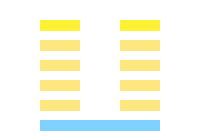
24.6 (24 > 27) - THE FÛ HEXAGRAM.
The topmost line, divided, shows its subject all astray on the subject of returning. There will be evil. There will be calamities and errors. If with his views he put the hosts in motion, the end will be a great defeat, whose issues will extend to the ruler of the state. Even in ten years he will not be able to repair the disaster.
Bing DeepL Google Yandex24.6 (24 > 27) - Not looking back
Before going, one wonders when one can return.
Bing DeepL Google Yandex24.6 (24 > 27) - Not looking back
Before going, one wonders when one can return.
Bing DeepL Google Yandex24.6 (24 > 27) - Fû, le retour
Fū : réparation, correction, amendement, retour à l’état originaire
L’illusion, l’erreur quant à sa propre correction est un grand mal, une cause de désastres. Le chef d’armée, dans ce cas, subira une grande défaite et causera à son roi des maux que dix années ne pourront réparer complètement.
C’est contraire aux règles à suivre par le prince.
24.6 (24 > 27) - Ne pas se retourner
Avant de partir, on se demande quand on pourra revenir.
Bing DeepL Google Yandex24.6 (24 > 27) - Visszatérés
Mielőtt elmenne, kíváncsi hogy mikor tér vissza.
Bing DeepL Google YandexThe derived (Fan Yao)
The same line number on the mutated hexagram. It reperesents what can be done AFTER to correct the situation described by this line, as a sort of remedy or solution.

59.5 (59 > 4) - THE HWÂN HEXAGRAM.
The fifth line, undivided, shows its subject amidst the dispersion issuing his great announcements as the perspiration (flows from his body). He scatters abroad (also) the accumulations in the royal granaries. There will be no error.
Bing DeepL Google Yandex59.5 (59 > 4) - Declining an offer
The others are expecting one to find the answer without help.
Bing DeepL Google Yandex59.5 (59 > 4) - Declining an offer
The others are expecting one to find the answer without help.
Bing DeepL Google Yandex59.5 (59 > 4) - Hwán, la dissolution
Hwán : extension, exposition, développement, abondance débordante ; dispersion, dissipation.
Répandre (hwán) la sueur avec des cris (de crainte et souffrance) ; répandre, distribuer (les biens accumulés dans) les magasins royaux, et cela sans regret, pour remédier aux maux des troubles et de la misère qui en est la conséquence.
Note. Ces deux phrases peuvent être indépendantes et exprimer simplement des emplois divers du mot hwán ; ou bien on peut construire ainsi : Quand la peine et la crainte pénètrent le peuple au point de lui faire pousser des cris comme s’il transpirait fortement, il faut alors l’aider au moyen des provisions accumulées dans les magasins publics.
59.5 (59 > 4) - Refuser une offre
Les autres attendent qu'on trouve la réponse sans aide.
Bing DeepL Google Yandex59.5 (59 > 4) - Elválasztás
Mások elvárják hogy segítség nélkül találjon választ.
Bing DeepL Google YandexThe juncture: 60.2
The derived of the reciprocal. It represents what could have been done BEFORE to prevent the situation described by this line, as a sort of remedy or solution.
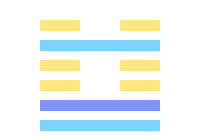
60.2 (60 > 3) - THE KIEH HEXAGRAM.
The second line, undivided, shows its subject not quitting the courtyard inside his gate. There will be evil.
Bing DeepL Google Yandex60.2 (60 > 3) - Hiding uncertainties
One shows confidence when the situation is serious.
Bing DeepL Google Yandex60.2 (60 > 3) - Hiding uncertainties
One shows confidence when the situation is serious.
Bing DeepL Google Yandex60.2 (60 > 3) - Tsieh, la délimitation
Tsieh : règle, loi, mesure.
Mais s’il ne passe pas la porte intérieure de la maison (celle du quartier intérieur, du quartier des femmes), il éprouvera les mauvais effets de cette conduite. (Ne voyant que partiellement ce qui se passe chez lui, il pourra lui arriver des désagréments.)
Il manquera le point de temps extrême pour faire le nécessaire selon les circonstances.
60.2 (60 > 3) - Cacher ses incertitudes
On fait preuve d'assurance quand la situation est grave.
Bing DeepL Google Yandex60.2 (60 > 3) - Korlátozás
Elrejti a bizonytalanságokat hogy uralja a helyzetet.
Bing DeepL Google YandexThe reciprocal: 3.2
The hexagram upside down. It represents the opposite situation, and as such is insturmental when validating comments.
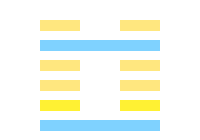
3.2 (3 > 60) - THE KUN HEXAGRAM
The second line, divided, shows (its subject) distressed and obliged to return; (even) the horses of her chariot (also) seem to be retreating. (But) not by a spoiler (is she assailed), but by one who seeks her to be his wife. The young lady maintains her firm correctness, and declines a union. After ten years she will be united, and have children.
Bing DeepL Google Yandex3.2 (3 > 60) - Resolving difficulties
One must establish a trusting relationship before others accept.
Bing DeepL Google Yandex3.2 (3 > 60) - Resolving difficulties
One must establish a relationship of trust before others accept.
Bing DeepL Google Yandex3.2 (3 > 60) - T’un, la difficulté initiale
T’un et tchun : A. 1. Bourgeon, pousse ; 2. Croissance, activité ; 3. Grandir, avancer. — B. Difficultés, arrêté dans son avancement, échec.
2a. Tchun est comme arrêté par les difficultés, comme un cavalier dont le cheval veut reculer (ou : un cheval monté qui veut...).
2b. C’est comme la jeune fille qui veut épouser un brigand ravisseur, elle doit rester inébranlable et attendre (plutôt) dix ans. (Malgré cela), elle pourra alors se marier et être mère. (Il est ici question de difficultés.)
Un équipage solide, l’enfantement après dix ans indique le retour à la prospérité, à l’avancement.
3.2 (3 > 60) - Remédier aux difficultés
On doit établir une relation de confiance avant que les autres n'acceptent.
Bing DeepL Google Yandex3.2 (3 > 60) - Megoldás
Megbízható kapcsolatokat kell kialakítania mielőtt mások elfogadnák.
Bing DeepL Google YandexMutations

4.5 (4 > 59) - THE MĂNG HEXAGRAM
The fifth line, divided, shows its subject as a simple lad without experience. There will be good fortune.
Bing DeepL Google Yandex4.5 (4 > 59) - Meng, la stupidité juvénile
Meng : Intelligence non encore développée ; être non encore formé.
L’ignorant, tout jeune encore, peut arriver à bien (être instruit).
Le bien de son état est la docilité, la douceur.
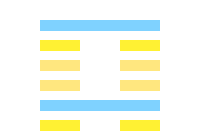
4.1.5 (4 > 61) - THE MĂNG HEXAGRAM
- 1. The first line, divided, (has respect to) the dispelling of ignorance. It will be advantageous to use punishment (for that purpose), and to remove the shackles (from the mind). But going on in that way (of punishment) will give occasion for regret.
- 5. The fifth line, divided, shows its subject as a simple lad without experience. There will be good fortune.
4.1.5 (4 > 61) - Meng, la stupidité juvénile
Meng : Intelligence non encore développée ; être non encore formé.
-
1. Pour dissiper l’ignorance, il faut user des châtiments.
Pour maintenir les règles en vigueur.
Il faut user d’avertissements et de punitions pour écarter toute cause de regret. -
5. L’ignorant, tout jeune encore, peut arriver à bien (être instruit).
Le bien de son état est la docilité, la douceur.
4.1.5 (4 > 61) - Tanácskérés
- 1. Megmutatni a tanulónak a határokat amiken nem léphet túl, majd bizalmat adni neki.
- 5. Nem hagyja abba a kérdezést.

4.2.5 (4 > 20) - THE MĂNG HEXAGRAM
- 2. The second line, undivided, (shows its subject) exercising forbearance with the ignorant, in which there will be good fortune; and admitting (even the goodness of women, which will also be fortunate. (He may be described also as) a son able to (sustain the burden of) his family.
- 5. The fifth line, divided, shows its subject as a simple lad without experience. There will be good fortune.
4.2.5 (4 > 20) - Seeing the bothers piling up
One goes through difficult times looking at their problems.
Bing DeepL Google Yandex4.2.5 (4 > 20) - Seeing the bothers piling up
One goes through difficult times looking at their problems.
Bing DeepL Google Yandex4.2.5 (4 > 20) - Meng, la stupidité juvénile
Meng : Intelligence non encore développée ; être non encore formé.
-
2. Il est bien de se préoccuper de l’ignorant et de soutenir la jeune fille. Ainsi, ils pourront triompher de leur ignorance.
L’enfant fait durer la famille ; il faut en avoir soin.
Le fort et le faible doivent s’entraider. -
5. L’ignorant, tout jeune encore, peut arriver à bien (être instruit).
Le bien de son état est la docilité, la douceur.
4.2.5 (4 > 20) - Voir les ennuis s'accumuler
On passe des moments difficiles à regarder ses problèmes.
Bing DeepL Google Yandex4.2.5 (4 > 20) - Tanácskérés
- 2. Ha valaki barátságos és bizalmas tanár, bíznak benne.
- 5. Nem hagyja abba a kérdezést.

4.1.2.5 (4 > 42) - THE MĂNG HEXAGRAM
- 1. The first line, divided, (has respect to) the dispelling of ignorance. It will be advantageous to use punishment (for that purpose), and to remove the shackles (from the mind). But going on in that way (of punishment) will give occasion for regret.
- 2. The second line, undivided, (shows its subject) exercising forbearance with the ignorant, in which there will be good fortune; and admitting (even the goodness of women, which will also be fortunate. (He may be described also as) a son able to (sustain the burden of) his family.
- 5. The fifth line, divided, shows its subject as a simple lad without experience. There will be good fortune.
4.1.2.5 (4 > 42) - Questioning
One will do things that others could not have done.
Bing DeepL Google Yandex4.1.2.5 (4 > 42) - Questioning
One will do things that others could not have done.
Bing DeepL Google Yandex4.1.2.5 (4 > 42) - Meng, la stupidité juvénile
Meng : Intelligence non encore développée ; être non encore formé.
-
1. Pour dissiper l’ignorance, il faut user des châtiments.
Pour maintenir les règles en vigueur.
Il faut user d’avertissements et de punitions pour écarter toute cause de regret. -
2. Il est bien de se préoccuper de l’ignorant et de soutenir la jeune fille. Ainsi, ils pourront triompher de leur ignorance.
L’enfant fait durer la famille ; il faut en avoir soin.
Le fort et le faible doivent s’entraider. -
5. L’ignorant, tout jeune encore, peut arriver à bien (être instruit).
Le bien de son état est la docilité, la douceur.
4.1.2.5 (4 > 42) - Interroger
On fera des choses que les autres n'auraient pas pu faire.
Bing DeepL Google Yandex4.1.2.5 (4 > 42) - Tanácskérés
- 1. Megmutatni a tanulónak a határokat amiken nem léphet túl, majd bizalmat adni neki.
- 2. Ha valaki barátságos és bizalmas tanár, bíznak benne.
- 5. Nem hagyja abba a kérdezést.
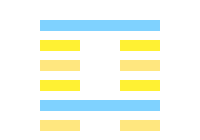
4.3.5 (4 > 57) - THE MĂNG HEXAGRAM
- 3. The third line, divided, (seems to say) that one should not marry a woman whose emblem it might be, for that, when she sees a man of wealth, she will not keep her person from him, and in no wise will advantage come from her.
- 5. The fifth line, divided, shows its subject as a simple lad without experience. There will be good fortune.
4.3.5 (4 > 57) - Having fun talking about others
One hears comments that do not concern those who profess them.
Bing DeepL Google Yandex4.3.5 (4 > 57) - Having fun talking about others
One hears comments that do not concern those who profess them.
Bing DeepL Google Yandex4.3.5 (4 > 57) - Meng, la stupidité juvénile
Meng : Intelligence non encore développée ; être non encore formé.
-
3. N’épousez pas une fille si elle ne considère que l’or, si elle ne se possède pas elle-même ; cela ne serait pas heureux.
Ce ne serait point agir convenablement.
C’est-à-dire une fille ayant la qualité dont il s’agit n’est pas à épouser. -
5. L’ignorant, tout jeune encore, peut arriver à bien (être instruit).
Le bien de son état est la docilité, la douceur.
4.3.5 (4 > 57) - Se divertir en parlant des autres
On entend des propos qui ne concernent pas ceux qui les profèrent.
Bing DeepL Google Yandex4.3.5 (4 > 57) - Tanácskérés
- 3. Nem engedhet a fiatalabbak türelmetlenségének.
- 5. Nem hagyja abba a kérdezést.
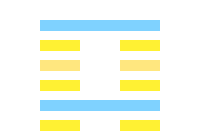
4.1.3.5 (4 > 9) - THE MĂNG HEXAGRAM
- 1. The first line, divided, (has respect to) the dispelling of ignorance. It will be advantageous to use punishment (for that purpose), and to remove the shackles (from the mind). But going on in that way (of punishment) will give occasion for regret.
- 3. The third line, divided, (seems to say) that one should not marry a woman whose emblem it might be, for that, when she sees a man of wealth, she will not keep her person from him, and in no wise will advantage come from her.
- 5. The fifth line, divided, shows its subject as a simple lad without experience. There will be good fortune.
4.1.3.5 (4 > 9) - Yielding to orders
One encourages those who do not want to jump in the water.
Bing DeepL Google Yandex4.1.3.5 (4 > 9) - Yielding to orders
One encourages those who do not want to jump in the water.
Bing DeepL Google Yandex4.1.3.5 (4 > 9) - Meng, la stupidité juvénile
Meng : Intelligence non encore développée ; être non encore formé.
-
1. Pour dissiper l’ignorance, il faut user des châtiments.
Pour maintenir les règles en vigueur.
Il faut user d’avertissements et de punitions pour écarter toute cause de regret. -
3. N’épousez pas une fille si elle ne considère que l’or, si elle ne se possède pas elle-même ; cela ne serait pas heureux.
Ce ne serait point agir convenablement.
C’est-à-dire une fille ayant la qualité dont il s’agit n’est pas à épouser. -
5. L’ignorant, tout jeune encore, peut arriver à bien (être instruit).
Le bien de son état est la docilité, la douceur.
4.1.3.5 (4 > 9) - Céder aux injonctions
On encourage ceux qui ne veulent pas se jeter à l'eau.
Bing DeepL Google Yandex4.1.3.5 (4 > 9) - Tanácskérés
- 1. Megmutatni a tanulónak a határokat amiken nem léphet túl, majd bizalmat adni neki.
- 3. Nem engedhet a fiatalabbak türelmetlenségének.
- 5. Nem hagyja abba a kérdezést.

4.2.3.5 (4 > 53) - THE MĂNG HEXAGRAM
- 2. The second line, undivided, (shows its subject) exercising forbearance with the ignorant, in which there will be good fortune; and admitting (even the goodness of women, which will also be fortunate. (He may be described also as) a son able to (sustain the burden of) his family.
- 3. The third line, divided, (seems to say) that one should not marry a woman whose emblem it might be, for that, when she sees a man of wealth, she will not keep her person from him, and in no wise will advantage come from her.
- 5. The fifth line, divided, shows its subject as a simple lad without experience. There will be good fortune.
4.2.3.5 (4 > 53) - Questioning
Guests are offered to begin with the introductions.
Bing DeepL Google Yandex4.2.3.5 (4 > 53) - Questioning
Guests are offered to begin with the introductions.
Bing DeepL Google Yandex4.2.3.5 (4 > 53) - Meng, la stupidité juvénile
Meng : Intelligence non encore développée ; être non encore formé.
-
2. Il est bien de se préoccuper de l’ignorant et de soutenir la jeune fille. Ainsi, ils pourront triompher de leur ignorance.
L’enfant fait durer la famille ; il faut en avoir soin.
Le fort et le faible doivent s’entraider. -
3. N’épousez pas une fille si elle ne considère que l’or, si elle ne se possède pas elle-même ; cela ne serait pas heureux.
Ce ne serait point agir convenablement.
C’est-à-dire une fille ayant la qualité dont il s’agit n’est pas à épouser. -
5. L’ignorant, tout jeune encore, peut arriver à bien (être instruit).
Le bien de son état est la docilité, la douceur.
4.2.3.5 (4 > 53) - Interroger
On propose aux invités de commencer par faire les présentations.
Bing DeepL Google Yandex4.2.3.5 (4 > 53) - Tanácskérés
- 2. Ha valaki barátságos és bizalmas tanár, bíznak benne.
- 3. Nem engedhet a fiatalabbak türelmetlenségének.
- 5. Nem hagyja abba a kérdezést.

4.1.2.3.5 (4 > 37) - THE MĂNG HEXAGRAM
- 1. The first line, divided, (has respect to) the dispelling of ignorance. It will be advantageous to use punishment (for that purpose), and to remove the shackles (from the mind). But going on in that way (of punishment) will give occasion for regret.
- 2. The second line, undivided, (shows its subject) exercising forbearance with the ignorant, in which there will be good fortune; and admitting (even the goodness of women, which will also be fortunate. (He may be described also as) a son able to (sustain the burden of) his family.
- 3. The third line, divided, (seems to say) that one should not marry a woman whose emblem it might be, for that, when she sees a man of wealth, she will not keep her person from him, and in no wise will advantage come from her.
- 5. The fifth line, divided, shows its subject as a simple lad without experience. There will be good fortune.
4.1.2.3.5 (4 > 37) - Abandoning the old clothing
One invites their guests to change outfit.
Bing DeepL Google Yandex4.1.2.3.5 (4 > 37) - Abandoning the old clothing
One invites their guests to change outfit.
Bing DeepL Google Yandex4.1.2.3.5 (4 > 37) - Meng, la stupidité juvénile
Meng : Intelligence non encore développée ; être non encore formé.
-
1. Pour dissiper l’ignorance, il faut user des châtiments.
Pour maintenir les règles en vigueur.
Il faut user d’avertissements et de punitions pour écarter toute cause de regret. -
2. Il est bien de se préoccuper de l’ignorant et de soutenir la jeune fille. Ainsi, ils pourront triompher de leur ignorance.
L’enfant fait durer la famille ; il faut en avoir soin.
Le fort et le faible doivent s’entraider. -
3. N’épousez pas une fille si elle ne considère que l’or, si elle ne se possède pas elle-même ; cela ne serait pas heureux.
Ce ne serait point agir convenablement.
C’est-à-dire une fille ayant la qualité dont il s’agit n’est pas à épouser. -
5. L’ignorant, tout jeune encore, peut arriver à bien (être instruit).
Le bien de son état est la docilité, la douceur.
4.1.2.3.5 (4 > 37) - Abandonner ses anciens vêtements
On propose à ses invités de changer de tenue.
Bing DeepL Google Yandex4.1.2.3.5 (4 > 37) - Tanácskérés
- 1. Megmutatni a tanulónak a határokat amiken nem léphet túl, majd bizalmat adni neki.
- 2. Ha valaki barátságos és bizalmas tanár, bíznak benne.
- 3. Nem engedhet a fiatalabbak türelmetlenségének.
- 5. Nem hagyja abba a kérdezést.

4.4.5 (4 > 6) - THE MĂNG HEXAGRAM
- 4. The fourth line, divided, (shows its subject as if) bound in chains of ignorance. There will be occasion for regret.
- 5. The fifth line, divided, shows its subject as a simple lad without experience. There will be good fortune.
4.4.5 (4 > 6) - Displaying creativity
One stops thinking like everyone else to search for a way to invent something more robust.
Bing DeepL Google Yandex4.4.5 (4 > 6) - Displaying creativity
One stops thinking like everyone else to search for a way to invent something more robust.
Bing DeepL Google Yandex4.4.5 (4 > 6) - Meng, la stupidité juvénile
Meng : Intelligence non encore développée ; être non encore formé.
- 4. L’ignorance pauvre et abandonnée est chose funeste. L’abandon, l’isolement tient éloignée la possession de la vérité.
-
5. L’ignorant, tout jeune encore, peut arriver à bien (être instruit).
Le bien de son état est la docilité, la douceur.
4.4.5 (4 > 6) - Faire preuve de créativité
On arrête de penser comme les autres pour chercher un moyen d'inventer quelque chose de plus solide.
Bing DeepL Google Yandex4.4.5 (4 > 6) - Tanácskérés
- 4. Ha valaki egyedül tanul, ez az ő döntése.
- 5. Nem hagyja abba a kérdezést.
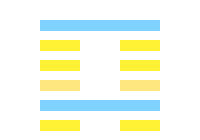
4.1.4.5 (4 > 10) - THE MĂNG HEXAGRAM
- 1. The first line, divided, (has respect to) the dispelling of ignorance. It will be advantageous to use punishment (for that purpose), and to remove the shackles (from the mind). But going on in that way (of punishment) will give occasion for regret.
- 4. The fourth line, divided, (shows its subject as if) bound in chains of ignorance. There will be occasion for regret.
- 5. The fifth line, divided, shows its subject as a simple lad without experience. There will be good fortune.
4.1.4.5 (4 > 10) - Questioning
One can subtract half of what they have received to help others progress.
Bing DeepL Google Yandex4.1.4.5 (4 > 10) - Questioning
One can subtract half of what they have received to help others progress.
Bing DeepL Google Yandex4.1.4.5 (4 > 10) - Meng, la stupidité juvénile
Meng : Intelligence non encore développée ; être non encore formé.
-
1. Pour dissiper l’ignorance, il faut user des châtiments.
Pour maintenir les règles en vigueur.
Il faut user d’avertissements et de punitions pour écarter toute cause de regret. - 4. L’ignorance pauvre et abandonnée est chose funeste. L’abandon, l’isolement tient éloignée la possession de la vérité.
-
5. L’ignorant, tout jeune encore, peut arriver à bien (être instruit).
Le bien de son état est la docilité, la douceur.
4.1.4.5 (4 > 10) - Interroger
On peut soustraire la moitié de ce qu'on à reçu pour aider les autres à progresser.
Bing DeepL Google Yandex4.1.4.5 (4 > 10) - Tanácskérés
- 1. Megmutatni a tanulónak a határokat amiken nem léphet túl, majd bizalmat adni neki.
- 4. Ha valaki egyedül tanul, ez az ő döntése.
- 5. Nem hagyja abba a kérdezést.

4.2.4.5 (4 > 12) - THE MĂNG HEXAGRAM
- 2. The second line, undivided, (shows its subject) exercising forbearance with the ignorant, in which there will be good fortune; and admitting (even the goodness of women, which will also be fortunate. (He may be described also as) a son able to (sustain the burden of) his family.
- 4. The fourth line, divided, (shows its subject as if) bound in chains of ignorance. There will be occasion for regret.
- 5. The fifth line, divided, shows its subject as a simple lad without experience. There will be good fortune.
4.2.4.5 (4 > 12) - Questioning
One thinks that they will be allowed to speak if they tell others beforehand.
Bing DeepL Google Yandex4.2.4.5 (4 > 12) - Questioning
One thinks that they will be allowed to speak if they tell others beforehand.
Bing DeepL Google Yandex4.2.4.5 (4 > 12) - Meng, la stupidité juvénile
Meng : Intelligence non encore développée ; être non encore formé.
-
2. Il est bien de se préoccuper de l’ignorant et de soutenir la jeune fille. Ainsi, ils pourront triompher de leur ignorance.
L’enfant fait durer la famille ; il faut en avoir soin.
Le fort et le faible doivent s’entraider. - 4. L’ignorance pauvre et abandonnée est chose funeste. L’abandon, l’isolement tient éloignée la possession de la vérité.
-
5. L’ignorant, tout jeune encore, peut arriver à bien (être instruit).
Le bien de son état est la docilité, la douceur.
4.2.4.5 (4 > 12) - Interroger
On pense que l'on aura le droit de parler si on prévient les autres à l'avance.
Bing DeepL Google Yandex4.2.4.5 (4 > 12) - Tanácskérés
- 2. Ha valaki barátságos és bizalmas tanár, bíznak benne.
- 4. Ha valaki egyedül tanul, ez az ő döntése.
- 5. Nem hagyja abba a kérdezést.

4.1.2.4.5 (4 > 25) - THE MĂNG HEXAGRAM
- 1. The first line, divided, (has respect to) the dispelling of ignorance. It will be advantageous to use punishment (for that purpose), and to remove the shackles (from the mind). But going on in that way (of punishment) will give occasion for regret.
- 2. The second line, undivided, (shows its subject) exercising forbearance with the ignorant, in which there will be good fortune; and admitting (even the goodness of women, which will also be fortunate. (He may be described also as) a son able to (sustain the burden of) his family.
- 4. The fourth line, divided, (shows its subject as if) bound in chains of ignorance. There will be occasion for regret.
- 5. The fifth line, divided, shows its subject as a simple lad without experience. There will be good fortune.
4.1.2.4.5 (4 > 25) - Knowing how to do it
One knows the reasons for the progress of the works.
Bing DeepL Google Yandex4.1.2.4.5 (4 > 25) - Knowing how to do it
One knows the reasons for the progress of the works.
Bing DeepL Google Yandex4.1.2.4.5 (4 > 25) - Meng, la stupidité juvénile
Meng : Intelligence non encore développée ; être non encore formé.
-
1. Pour dissiper l’ignorance, il faut user des châtiments.
Pour maintenir les règles en vigueur.
Il faut user d’avertissements et de punitions pour écarter toute cause de regret. -
2. Il est bien de se préoccuper de l’ignorant et de soutenir la jeune fille. Ainsi, ils pourront triompher de leur ignorance.
L’enfant fait durer la famille ; il faut en avoir soin.
Le fort et le faible doivent s’entraider. - 4. L’ignorance pauvre et abandonnée est chose funeste. L’abandon, l’isolement tient éloignée la possession de la vérité.
-
5. L’ignorant, tout jeune encore, peut arriver à bien (être instruit).
Le bien de son état est la docilité, la douceur.
4.1.2.4.5 (4 > 25) - Savoir comment on fait
On connaît les raisons de l'avancement des travaux.
Bing DeepL Google Yandex4.1.2.4.5 (4 > 25) - Tanácskérés
- 1. Megmutatni a tanulónak a határokat amiken nem léphet túl, majd bizalmat adni neki.
- 2. Ha valaki barátságos és bizalmas tanár, bíznak benne.
- 4. Ha valaki egyedül tanul, ez az ő döntése.
- 5. Nem hagyja abba a kérdezést.

4.3.4.5 (4 > 44) - THE MĂNG HEXAGRAM
- 3. The third line, divided, (seems to say) that one should not marry a woman whose emblem it might be, for that, when she sees a man of wealth, she will not keep her person from him, and in no wise will advantage come from her.
- 4. The fourth line, divided, (shows its subject as if) bound in chains of ignorance. There will be occasion for regret.
- 5. The fifth line, divided, shows its subject as a simple lad without experience. There will be good fortune.
4.3.4.5 (4 > 44) - Questioning
One talks about different topics depending on who they are talking to.
Bing DeepL Google Yandex4.3.4.5 (4 > 44) - Questioning
One talks about different topics depending on who they are talking to.
Bing DeepL Google Yandex4.3.4.5 (4 > 44) - Meng, la stupidité juvénile
Meng : Intelligence non encore développée ; être non encore formé.
-
3. N’épousez pas une fille si elle ne considère que l’or, si elle ne se possède pas elle-même ; cela ne serait pas heureux.
Ce ne serait point agir convenablement.
C’est-à-dire une fille ayant la qualité dont il s’agit n’est pas à épouser. - 4. L’ignorance pauvre et abandonnée est chose funeste. L’abandon, l’isolement tient éloignée la possession de la vérité.
-
5. L’ignorant, tout jeune encore, peut arriver à bien (être instruit).
Le bien de son état est la docilité, la douceur.
4.3.4.5 (4 > 44) - Interroger
On parle de sujets différents selon ses interlocuteurs.
Bing DeepL Google Yandex4.3.4.5 (4 > 44) - Tanácskérés
- 3. Nem engedhet a fiatalabbak türelmetlenségének.
- 4. Ha valaki egyedül tanul, ez az ő döntése.
- 5. Nem hagyja abba a kérdezést.
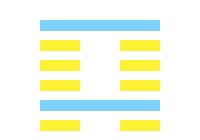
4.1.3.4.5 (4 > 1) - THE MĂNG HEXAGRAM
- 1. The first line, divided, (has respect to) the dispelling of ignorance. It will be advantageous to use punishment (for that purpose), and to remove the shackles (from the mind). But going on in that way (of punishment) will give occasion for regret.
- 3. The third line, divided, (seems to say) that one should not marry a woman whose emblem it might be, for that, when she sees a man of wealth, she will not keep her person from him, and in no wise will advantage come from her.
- 4. The fourth line, divided, (shows its subject as if) bound in chains of ignorance. There will be occasion for regret.
- 5. The fifth line, divided, shows its subject as a simple lad without experience. There will be good fortune.
4.1.3.4.5 (4 > 1) - Supporting those one appreciate
One guides their friends when they are in difficulty.
Bing DeepL Google Yandex4.1.3.4.5 (4 > 1) - Supporting those one appreciate
One guides their friends when they are in difficulty.
Bing DeepL Google Yandex4.1.3.4.5 (4 > 1) - Meng, la stupidité juvénile
Meng : Intelligence non encore développée ; être non encore formé.
-
1. Pour dissiper l’ignorance, il faut user des châtiments.
Pour maintenir les règles en vigueur.
Il faut user d’avertissements et de punitions pour écarter toute cause de regret. -
3. N’épousez pas une fille si elle ne considère que l’or, si elle ne se possède pas elle-même ; cela ne serait pas heureux.
Ce ne serait point agir convenablement.
C’est-à-dire une fille ayant la qualité dont il s’agit n’est pas à épouser. - 4. L’ignorance pauvre et abandonnée est chose funeste. L’abandon, l’isolement tient éloignée la possession de la vérité.
-
5. L’ignorant, tout jeune encore, peut arriver à bien (être instruit).
Le bien de son état est la docilité, la douceur.
4.1.3.4.5 (4 > 1) - Soutenir ceux qu’on apprécie
On guide ses amis quand ils sont en difficulté.
Bing DeepL Google Yandex4.1.3.4.5 (4 > 1) - Tanácskérés
- 1. Megmutatni a tanulónak a határokat amiken nem léphet túl, majd bizalmat adni neki.
- 3. Nem engedhet a fiatalabbak türelmetlenségének.
- 4. Ha valaki egyedül tanul, ez az ő döntése.
- 5. Nem hagyja abba a kérdezést.

4.2.3.4.5 (4 > 33) - THE MĂNG HEXAGRAM
- 2. The second line, undivided, (shows its subject) exercising forbearance with the ignorant, in which there will be good fortune; and admitting (even the goodness of women, which will also be fortunate. (He may be described also as) a son able to (sustain the burden of) his family.
- 3. The third line, divided, (seems to say) that one should not marry a woman whose emblem it might be, for that, when she sees a man of wealth, she will not keep her person from him, and in no wise will advantage come from her.
- 4. The fourth line, divided, (shows its subject as if) bound in chains of ignorance. There will be occasion for regret.
- 5. The fifth line, divided, shows its subject as a simple lad without experience. There will be good fortune.
4.2.3.4.5 (4 > 33) - Being the target of unfair criticism
Others want to know what they can get for their services
Bing DeepL Google Yandex4.2.3.4.5 (4 > 33) - Being the target of unfair criticism
Others want to know what they can get for their services
Bing DeepL Google Yandex4.2.3.4.5 (4 > 33) - Meng, la stupidité juvénile
Meng : Intelligence non encore développée ; être non encore formé.
-
2. Il est bien de se préoccuper de l’ignorant et de soutenir la jeune fille. Ainsi, ils pourront triompher de leur ignorance.
L’enfant fait durer la famille ; il faut en avoir soin.
Le fort et le faible doivent s’entraider. -
3. N’épousez pas une fille si elle ne considère que l’or, si elle ne se possède pas elle-même ; cela ne serait pas heureux.
Ce ne serait point agir convenablement.
C’est-à-dire une fille ayant la qualité dont il s’agit n’est pas à épouser. - 4. L’ignorance pauvre et abandonnée est chose funeste. L’abandon, l’isolement tient éloignée la possession de la vérité.
-
5. L’ignorant, tout jeune encore, peut arriver à bien (être instruit).
Le bien de son état est la docilité, la douceur.
4.2.3.4.5 (4 > 33) - Être la cible de critiques injustes
Les autres veulent savoir ce qu'ils peuvent obtenir en récompense de leurs services
Bing DeepL Google Yandex4.2.3.4.5 (4 > 33) - Tanácskérés
- 2. Ha valaki barátságos és bizalmas tanár, bíznak benne.
- 3. Nem engedhet a fiatalabbak türelmetlenségének.
- 4. Ha valaki egyedül tanul, ez az ő döntése.
- 5. Nem hagyja abba a kérdezést.

4.1.2.3.4.5 (4 > 13) - THE MĂNG HEXAGRAM
- 1. The first line, divided, (has respect to) the dispelling of ignorance. It will be advantageous to use punishment (for that purpose), and to remove the shackles (from the mind). But going on in that way (of punishment) will give occasion for regret.
- 2. The second line, undivided, (shows its subject) exercising forbearance with the ignorant, in which there will be good fortune; and admitting (even the goodness of women, which will also be fortunate. (He may be described also as) a son able to (sustain the burden of) his family.
- 3. The third line, divided, (seems to say) that one should not marry a woman whose emblem it might be, for that, when she sees a man of wealth, she will not keep her person from him, and in no wise will advantage come from her.
- 4. The fourth line, divided, (shows its subject as if) bound in chains of ignorance. There will be occasion for regret.
- 5. The fifth line, divided, shows its subject as a simple lad without experience. There will be good fortune.
4.1.2.3.4.5 (4 > 13) - Questioning
One would be well advised not to change their mind too often.
Bing DeepL Google Yandex4.1.2.3.4.5 (4 > 13) - Questioning
One would be well advised not to change their mind too often.
Bing DeepL Google Yandex4.1.2.3.4.5 (4 > 13) - Meng, la stupidité juvénile
Meng : Intelligence non encore développée ; être non encore formé.
-
1. Pour dissiper l’ignorance, il faut user des châtiments.
Pour maintenir les règles en vigueur.
Il faut user d’avertissements et de punitions pour écarter toute cause de regret. -
2. Il est bien de se préoccuper de l’ignorant et de soutenir la jeune fille. Ainsi, ils pourront triompher de leur ignorance.
L’enfant fait durer la famille ; il faut en avoir soin.
Le fort et le faible doivent s’entraider. -
3. N’épousez pas une fille si elle ne considère que l’or, si elle ne se possède pas elle-même ; cela ne serait pas heureux.
Ce ne serait point agir convenablement.
C’est-à-dire une fille ayant la qualité dont il s’agit n’est pas à épouser. - 4. L’ignorance pauvre et abandonnée est chose funeste. L’abandon, l’isolement tient éloignée la possession de la vérité.
-
5. L’ignorant, tout jeune encore, peut arriver à bien (être instruit).
Le bien de son état est la docilité, la douceur.
4.1.2.3.4.5 (4 > 13) - Interroger
On sera bien avisé de ne pas changer d'avis trop souvent.
Bing DeepL Google Yandex4.1.2.3.4.5 (4 > 13) - Tanácskérés
- 1. Megmutatni a tanulónak a határokat amiken nem léphet túl, majd bizalmat adni neki.
- 2. Ha valaki barátságos és bizalmas tanár, bíznak benne.
- 3. Nem engedhet a fiatalabbak türelmetlenségének.
- 4. Ha valaki egyedül tanul, ez az ő döntése.
- 5. Nem hagyja abba a kérdezést.

4.5.6 (4 > 29) - THE MĂNG HEXAGRAM
- 5. The fifth line, divided, shows its subject as a simple lad without experience. There will be good fortune.
- 6. In the topmost line, undivided, we see one smiting the ignorant (youth). But no advantage will come from doing him an injury. Advantage would come from warding off injury from him.
4.5.6 (4 > 29) - Questioning
More resources are planned so that others are received comfortably.
Bing DeepL Google Yandex4.5.6 (4 > 29) - Questioning
More resources are planned so that others are received comfortably.
Bing DeepL Google Yandex4.5.6 (4 > 29) - Meng, la stupidité juvénile
Meng : Intelligence non encore développée ; être non encore formé.
-
5. L’ignorant, tout jeune encore, peut arriver à bien (être instruit).
Le bien de son état est la docilité, la douceur. - 6. Si l’on châtie l’ignorant en le formant, on ne doit point lui faire de tort, mais au contraire l’en préserver.
4.5.6 (4 > 29) - Interroger
On prévoit plus de moyens pour que les autres soient reçus confortablement.
Bing DeepL Google Yandex4.5.6 (4 > 29) - Tanácskérés
- 5. Nem hagyja abba a kérdezést.
- 6. Elutasítani akik átlépik a határokat.

4.1.5.6 (4 > 60) - THE MĂNG HEXAGRAM
- 1. The first line, divided, (has respect to) the dispelling of ignorance. It will be advantageous to use punishment (for that purpose), and to remove the shackles (from the mind). But going on in that way (of punishment) will give occasion for regret.
- 5. The fifth line, divided, shows its subject as a simple lad without experience. There will be good fortune.
- 6. In the topmost line, undivided, we see one smiting the ignorant (youth). But no advantage will come from doing him an injury. Advantage would come from warding off injury from him.
4.1.5.6 (4 > 60) - Questioning
One will give tokens of friendship to those who have shown.
Bing DeepL Google Yandex4.1.5.6 (4 > 60) - Questioning
One will give tokens of friendship to those with who have shown.
Bing DeepL Google Yandex4.1.5.6 (4 > 60) - Meng, la stupidité juvénile
Meng : Intelligence non encore développée ; être non encore formé.
-
1. Pour dissiper l’ignorance, il faut user des châtiments.
Pour maintenir les règles en vigueur.
Il faut user d’avertissements et de punitions pour écarter toute cause de regret. -
5. L’ignorant, tout jeune encore, peut arriver à bien (être instruit).
Le bien de son état est la docilité, la douceur. - 6. Si l’on châtie l’ignorant en le formant, on ne doit point lui faire de tort, mais au contraire l’en préserver.
4.1.5.6 (4 > 60) - Interroger
On donnera des gages d'amitié à ceux qui ont montré.
Bing DeepL Google Yandex4.1.5.6 (4 > 60) - Tanácskérés
- 1. Megmutatni a tanulónak a határokat amiken nem léphet túl, majd bizalmat adni neki.
- 5. Nem hagyja abba a kérdezést.
- 6. Elutasítani akik átlépik a határokat.
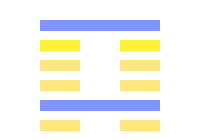
4.2.5.6 (4 > 8) - THE MĂNG HEXAGRAM
- 2. The second line, undivided, (shows its subject) exercising forbearance with the ignorant, in which there will be good fortune; and admitting (even the goodness of women, which will also be fortunate. (He may be described also as) a son able to (sustain the burden of) his family.
- 5. The fifth line, divided, shows its subject as a simple lad without experience. There will be good fortune.
- 6. In the topmost line, undivided, we see one smiting the ignorant (youth). But no advantage will come from doing him an injury. Advantage would come from warding off injury from him.
4.2.5.6 (4 > 8) - Questioning
One will have a lot of panache if they assume the consequences of their actions.
Bing DeepL Google Yandex4.2.5.6 (4 > 8) - Questioning
One will have a lot of panache if they assume the consequences of their actions.
Bing DeepL Google Yandex4.2.5.6 (4 > 8) - Meng, la stupidité juvénile
Meng : Intelligence non encore développée ; être non encore formé.
-
2. Il est bien de se préoccuper de l’ignorant et de soutenir la jeune fille. Ainsi, ils pourront triompher de leur ignorance.
L’enfant fait durer la famille ; il faut en avoir soin.
Le fort et le faible doivent s’entraider. -
5. L’ignorant, tout jeune encore, peut arriver à bien (être instruit).
Le bien de son état est la docilité, la douceur. - 6. Si l’on châtie l’ignorant en le formant, on ne doit point lui faire de tort, mais au contraire l’en préserver.
4.2.5.6 (4 > 8) - Interroger
On aura beaucoup de panache si l'on assume les conséquences de ses actions.
Bing DeepL Google Yandex4.2.5.6 (4 > 8) - Tanácskérés
- 2. Ha valaki barátságos és bizalmas tanár, bíznak benne.
- 5. Nem hagyja abba a kérdezést.
- 6. Elutasítani akik átlépik a határokat.
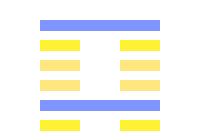
4.1.2.5.6 (4 > 3) - THE MĂNG HEXAGRAM
- 1. The first line, divided, (has respect to) the dispelling of ignorance. It will be advantageous to use punishment (for that purpose), and to remove the shackles (from the mind). But going on in that way (of punishment) will give occasion for regret.
- 2. The second line, undivided, (shows its subject) exercising forbearance with the ignorant, in which there will be good fortune; and admitting (even the goodness of women, which will also be fortunate. (He may be described also as) a son able to (sustain the burden of) his family.
- 5. The fifth line, divided, shows its subject as a simple lad without experience. There will be good fortune.
- 6. In the topmost line, undivided, we see one smiting the ignorant (youth). But no advantage will come from doing him an injury. Advantage would come from warding off injury from him.
4.1.2.5.6 (4 > 3) - Questioning
One leaves so that others know that they may continue without being observed.
Bing DeepL Google Yandex4.1.2.5.6 (4 > 3) - Questioning
One leaves so that others know that they may continue without being observed.
Bing DeepL Google Yandex4.1.2.5.6 (4 > 3) - Meng, la stupidité juvénile
Meng : Intelligence non encore développée ; être non encore formé.
-
1. Pour dissiper l’ignorance, il faut user des châtiments.
Pour maintenir les règles en vigueur.
Il faut user d’avertissements et de punitions pour écarter toute cause de regret. -
2. Il est bien de se préoccuper de l’ignorant et de soutenir la jeune fille. Ainsi, ils pourront triompher de leur ignorance.
L’enfant fait durer la famille ; il faut en avoir soin.
Le fort et le faible doivent s’entraider. -
5. L’ignorant, tout jeune encore, peut arriver à bien (être instruit).
Le bien de son état est la docilité, la douceur. - 6. Si l’on châtie l’ignorant en le formant, on ne doit point lui faire de tort, mais au contraire l’en préserver.
4.1.2.5.6 (4 > 3) - Interroger
On s'en va pour que les autres sachent qu'ils peuvent continuer sans qu'on les observe.
Bing DeepL Google Yandex4.1.2.5.6 (4 > 3) - Tanácskérés
- 1. Megmutatni a tanulónak a határokat amiken nem léphet túl, majd bizalmat adni neki.
- 2. Ha valaki barátságos és bizalmas tanár, bíznak benne.
- 5. Nem hagyja abba a kérdezést.
- 6. Elutasítani akik átlépik a határokat.
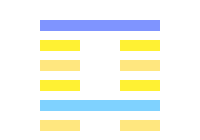
4.3.5.6 (4 > 48) - THE MĂNG HEXAGRAM
- 3. The third line, divided, (seems to say) that one should not marry a woman whose emblem it might be, for that, when she sees a man of wealth, she will not keep her person from him, and in no wise will advantage come from her.
- 5. The fifth line, divided, shows its subject as a simple lad without experience. There will be good fortune.
- 6. In the topmost line, undivided, we see one smiting the ignorant (youth). But no advantage will come from doing him an injury. Advantage would come from warding off injury from him.
4.3.5.6 (4 > 48) - Questioning
One thinks they will still have some attractions to bring in the most able and show them what one has designed.
Bing DeepL Google Yandex4.3.5.6 (4 > 48) - Questioning
One thinks they will still have some attractions to bring in the most able and show them what one has designed.
Bing DeepL Google Yandex4.3.5.6 (4 > 48) - Meng, la stupidité juvénile
Meng : Intelligence non encore développée ; être non encore formé.
-
3. N’épousez pas une fille si elle ne considère que l’or, si elle ne se possède pas elle-même ; cela ne serait pas heureux.
Ce ne serait point agir convenablement.
C’est-à-dire une fille ayant la qualité dont il s’agit n’est pas à épouser. -
5. L’ignorant, tout jeune encore, peut arriver à bien (être instruit).
Le bien de son état est la docilité, la douceur. - 6. Si l’on châtie l’ignorant en le formant, on ne doit point lui faire de tort, mais au contraire l’en préserver.
4.3.5.6 (4 > 48) - Interroger
On pense que l'on aura encore des attraits pour faire venir les plus compétents et leur montrer ce qu'on a conçu.
Bing DeepL Google Yandex4.3.5.6 (4 > 48) - Tanácskérés
- 3. Nem engedhet a fiatalabbak türelmetlenségének.
- 5. Nem hagyja abba a kérdezést.
- 6. Elutasítani akik átlépik a határokat.
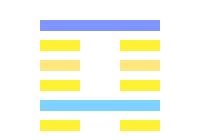
4.1.3.5.6 (4 > 5) - THE MĂNG HEXAGRAM
- 1. The first line, divided, (has respect to) the dispelling of ignorance. It will be advantageous to use punishment (for that purpose), and to remove the shackles (from the mind). But going on in that way (of punishment) will give occasion for regret.
- 3. The third line, divided, (seems to say) that one should not marry a woman whose emblem it might be, for that, when she sees a man of wealth, she will not keep her person from him, and in no wise will advantage come from her.
- 5. The fifth line, divided, shows its subject as a simple lad without experience. There will be good fortune.
- 6. In the topmost line, undivided, we see one smiting the ignorant (youth). But no advantage will come from doing him an injury. Advantage would come from warding off injury from him.
4.1.3.5.6 (4 > 5) - Questioning
One would do well not to compromise oneself with dishonest people.
Bing DeepL Google Yandex4.1.3.5.6 (4 > 5) - Questioning
One would do well not to compromise oneself with dishonest people.
Bing DeepL Google Yandex4.1.3.5.6 (4 > 5) - Meng, la stupidité juvénile
Meng : Intelligence non encore développée ; être non encore formé.
-
1. Pour dissiper l’ignorance, il faut user des châtiments.
Pour maintenir les règles en vigueur.
Il faut user d’avertissements et de punitions pour écarter toute cause de regret. -
3. N’épousez pas une fille si elle ne considère que l’or, si elle ne se possède pas elle-même ; cela ne serait pas heureux.
Ce ne serait point agir convenablement.
C’est-à-dire une fille ayant la qualité dont il s’agit n’est pas à épouser. -
5. L’ignorant, tout jeune encore, peut arriver à bien (être instruit).
Le bien de son état est la docilité, la douceur. - 6. Si l’on châtie l’ignorant en le formant, on ne doit point lui faire de tort, mais au contraire l’en préserver.
4.1.3.5.6 (4 > 5) - Interroger
On fera bien de ne pas se compromettre avec des personnes malhonnêtes.
Bing DeepL Google Yandex4.1.3.5.6 (4 > 5) - Tanácskérés
- 1. Megmutatni a tanulónak a határokat amiken nem léphet túl, majd bizalmat adni neki.
- 3. Nem engedhet a fiatalabbak türelmetlenségének.
- 5. Nem hagyja abba a kérdezést.
- 6. Elutasítani akik átlépik a határokat.
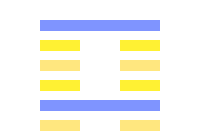
4.2.3.5.6 (4 > 39) - THE MĂNG HEXAGRAM
- 2. The second line, undivided, (shows its subject) exercising forbearance with the ignorant, in which there will be good fortune; and admitting (even the goodness of women, which will also be fortunate. (He may be described also as) a son able to (sustain the burden of) his family.
- 3. The third line, divided, (seems to say) that one should not marry a woman whose emblem it might be, for that, when she sees a man of wealth, she will not keep her person from him, and in no wise will advantage come from her.
- 5. The fifth line, divided, shows its subject as a simple lad without experience. There will be good fortune.
- 6. In the topmost line, undivided, we see one smiting the ignorant (youth). But no advantage will come from doing him an injury. Advantage would come from warding off injury from him.
4.2.3.5.6 (4 > 39) - Questioning
One will be ready to say things that others will not like to hear.
Bing DeepL Google Yandex4.2.3.5.6 (4 > 39) - Questioning
One will be ready to say things that others will not like to hear.
Bing DeepL Google Yandex4.2.3.5.6 (4 > 39) - Meng, la stupidité juvénile
Meng : Intelligence non encore développée ; être non encore formé.
-
2. Il est bien de se préoccuper de l’ignorant et de soutenir la jeune fille. Ainsi, ils pourront triompher de leur ignorance.
L’enfant fait durer la famille ; il faut en avoir soin.
Le fort et le faible doivent s’entraider. -
3. N’épousez pas une fille si elle ne considère que l’or, si elle ne se possède pas elle-même ; cela ne serait pas heureux.
Ce ne serait point agir convenablement.
C’est-à-dire une fille ayant la qualité dont il s’agit n’est pas à épouser. -
5. L’ignorant, tout jeune encore, peut arriver à bien (être instruit).
Le bien de son état est la docilité, la douceur. - 6. Si l’on châtie l’ignorant en le formant, on ne doit point lui faire de tort, mais au contraire l’en préserver.
4.2.3.5.6 (4 > 39) - Interroger
On sera prêt à dire des choses que les autres ne vont pas aimer entendre.
Bing DeepL Google Yandex4.2.3.5.6 (4 > 39) - Tanácskérés
- 2. Ha valaki barátságos és bizalmas tanár, bíznak benne.
- 3. Nem engedhet a fiatalabbak türelmetlenségének.
- 5. Nem hagyja abba a kérdezést.
- 6. Elutasítani akik átlépik a határokat.
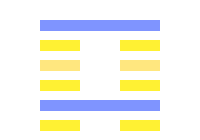
4.1.2.3.5.6 (4 > 63) - THE MĂNG HEXAGRAM
- 1. The first line, divided, (has respect to) the dispelling of ignorance. It will be advantageous to use punishment (for that purpose), and to remove the shackles (from the mind). But going on in that way (of punishment) will give occasion for regret.
- 2. The second line, undivided, (shows its subject) exercising forbearance with the ignorant, in which there will be good fortune; and admitting (even the goodness of women, which will also be fortunate. (He may be described also as) a son able to (sustain the burden of) his family.
- 3. The third line, divided, (seems to say) that one should not marry a woman whose emblem it might be, for that, when she sees a man of wealth, she will not keep her person from him, and in no wise will advantage come from her.
- 5. The fifth line, divided, shows its subject as a simple lad without experience. There will be good fortune.
- 6. In the topmost line, undivided, we see one smiting the ignorant (youth). But no advantage will come from doing him an injury. Advantage would come from warding off injury from him.
4.1.2.3.5.6 (4 > 63) - Questioning
One expects troubles so they get ready to fight.
Bing DeepL Google Yandex4.1.2.3.5.6 (4 > 63) - Questioning
One expects troubles so they get ready to fight.
Bing DeepL Google Yandex4.1.2.3.5.6 (4 > 63) - Meng, la stupidité juvénile
Meng : Intelligence non encore développée ; être non encore formé.
-
1. Pour dissiper l’ignorance, il faut user des châtiments.
Pour maintenir les règles en vigueur.
Il faut user d’avertissements et de punitions pour écarter toute cause de regret. -
2. Il est bien de se préoccuper de l’ignorant et de soutenir la jeune fille. Ainsi, ils pourront triompher de leur ignorance.
L’enfant fait durer la famille ; il faut en avoir soin.
Le fort et le faible doivent s’entraider. -
3. N’épousez pas une fille si elle ne considère que l’or, si elle ne se possède pas elle-même ; cela ne serait pas heureux.
Ce ne serait point agir convenablement.
C’est-à-dire une fille ayant la qualité dont il s’agit n’est pas à épouser. -
5. L’ignorant, tout jeune encore, peut arriver à bien (être instruit).
Le bien de son état est la docilité, la douceur. - 6. Si l’on châtie l’ignorant en le formant, on ne doit point lui faire de tort, mais au contraire l’en préserver.
4.1.2.3.5.6 (4 > 63) - Interroger
On prévoit des ennuis alors on se prépare à combattre.
Bing DeepL Google Yandex4.1.2.3.5.6 (4 > 63) - Tanácskérés
- 1. Megmutatni a tanulónak a határokat amiken nem léphet túl, majd bizalmat adni neki.
- 2. Ha valaki barátságos és bizalmas tanár, bíznak benne.
- 3. Nem engedhet a fiatalabbak türelmetlenségének.
- 5. Nem hagyja abba a kérdezést.
- 6. Elutasítani akik átlépik a határokat.

4.4.5.6 (4 > 47) - THE MĂNG HEXAGRAM
- 4. The fourth line, divided, (shows its subject as if) bound in chains of ignorance. There will be occasion for regret.
- 5. The fifth line, divided, shows its subject as a simple lad without experience. There will be good fortune.
- 6. In the topmost line, undivided, we see one smiting the ignorant (youth). But no advantage will come from doing him an injury. Advantage would come from warding off injury from him.
4.4.5.6 (4 > 47) - Questioning
One recovers strength until the others arrive.
Bing DeepL Google Yandex4.4.5.6 (4 > 47) - Questioning
One recovers strength until the others arrive.
Bing DeepL Google Yandex4.4.5.6 (4 > 47) - Meng, la stupidité juvénile
Meng : Intelligence non encore développée ; être non encore formé.
- 4. L’ignorance pauvre et abandonnée est chose funeste. L’abandon, l’isolement tient éloignée la possession de la vérité.
-
5. L’ignorant, tout jeune encore, peut arriver à bien (être instruit).
Le bien de son état est la docilité, la douceur. - 6. Si l’on châtie l’ignorant en le formant, on ne doit point lui faire de tort, mais au contraire l’en préserver.
4.4.5.6 (4 > 47) - Interroger
On récupère des forces en attendant que les autres arrivent.
Bing DeepL Google Yandex4.4.5.6 (4 > 47) - Tanácskérés
- 4. Ha valaki egyedül tanul, ez az ő döntése.
- 5. Nem hagyja abba a kérdezést.
- 6. Elutasítani akik átlépik a határokat.

4.1.4.5.6 (4 > 58) - THE MĂNG HEXAGRAM
- 1. The first line, divided, (has respect to) the dispelling of ignorance. It will be advantageous to use punishment (for that purpose), and to remove the shackles (from the mind). But going on in that way (of punishment) will give occasion for regret.
- 4. The fourth line, divided, (shows its subject as if) bound in chains of ignorance. There will be occasion for regret.
- 5. The fifth line, divided, shows its subject as a simple lad without experience. There will be good fortune.
- 6. In the topmost line, undivided, we see one smiting the ignorant (youth). But no advantage will come from doing him an injury. Advantage would come from warding off injury from him.
4.1.4.5.6 (4 > 58) - Questioning
One prepares others to do as if they were gifted.
Bing DeepL Google Yandex4.1.4.5.6 (4 > 58) - Questioning
One prepares others to do as if they were gifted.
Bing DeepL Google Yandex4.1.4.5.6 (4 > 58) - Meng, la stupidité juvénile
Meng : Intelligence non encore développée ; être non encore formé.
-
1. Pour dissiper l’ignorance, il faut user des châtiments.
Pour maintenir les règles en vigueur.
Il faut user d’avertissements et de punitions pour écarter toute cause de regret. - 4. L’ignorance pauvre et abandonnée est chose funeste. L’abandon, l’isolement tient éloignée la possession de la vérité.
-
5. L’ignorant, tout jeune encore, peut arriver à bien (être instruit).
Le bien de son état est la docilité, la douceur. - 6. Si l’on châtie l’ignorant en le formant, on ne doit point lui faire de tort, mais au contraire l’en préserver.
4.1.4.5.6 (4 > 58) - Interroger
On prépare les autres à faire comme si ils étaient doués.
Bing DeepL Google Yandex4.1.4.5.6 (4 > 58) - Tanácskérés
- 1. Megmutatni a tanulónak a határokat amiken nem léphet túl, majd bizalmat adni neki.
- 4. Ha valaki egyedül tanul, ez az ő döntése.
- 5. Nem hagyja abba a kérdezést.
- 6. Elutasítani akik átlépik a határokat.
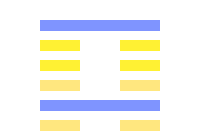
4.2.4.5.6 (4 > 45) - THE MĂNG HEXAGRAM
- 2. The second line, undivided, (shows its subject) exercising forbearance with the ignorant, in which there will be good fortune; and admitting (even the goodness of women, which will also be fortunate. (He may be described also as) a son able to (sustain the burden of) his family.
- 4. The fourth line, divided, (shows its subject as if) bound in chains of ignorance. There will be occasion for regret.
- 5. The fifth line, divided, shows its subject as a simple lad without experience. There will be good fortune.
- 6. In the topmost line, undivided, we see one smiting the ignorant (youth). But no advantage will come from doing him an injury. Advantage would come from warding off injury from him.
4.2.4.5.6 (4 > 45) - Questioning
Others are exerting pressures to make one lose confidence.
Bing DeepL Google Yandex4.2.4.5.6 (4 > 45) - Questioning
Others are exerting pressures to make one lose confidence.
Bing DeepL Google Yandex4.2.4.5.6 (4 > 45) - Meng, la stupidité juvénile
Meng : Intelligence non encore développée ; être non encore formé.
-
2. Il est bien de se préoccuper de l’ignorant et de soutenir la jeune fille. Ainsi, ils pourront triompher de leur ignorance.
L’enfant fait durer la famille ; il faut en avoir soin.
Le fort et le faible doivent s’entraider. - 4. L’ignorance pauvre et abandonnée est chose funeste. L’abandon, l’isolement tient éloignée la possession de la vérité.
-
5. L’ignorant, tout jeune encore, peut arriver à bien (être instruit).
Le bien de son état est la docilité, la douceur. - 6. Si l’on châtie l’ignorant en le formant, on ne doit point lui faire de tort, mais au contraire l’en préserver.
4.2.4.5.6 (4 > 45) - Interroger
Les autres exercent des pressions pour que l'on perde confiance.
Bing DeepL Google Yandex4.2.4.5.6 (4 > 45) - Tanácskérés
- 2. Ha valaki barátságos és bizalmas tanár, bíznak benne.
- 4. Ha valaki egyedül tanul, ez az ő döntése.
- 5. Nem hagyja abba a kérdezést.
- 6. Elutasítani akik átlépik a határokat.
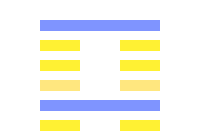
4.1.2.4.5.6 (4 > 17) - THE MĂNG HEXAGRAM
- 1. The first line, divided, (has respect to) the dispelling of ignorance. It will be advantageous to use punishment (for that purpose), and to remove the shackles (from the mind). But going on in that way (of punishment) will give occasion for regret.
- 2. The second line, undivided, (shows its subject) exercising forbearance with the ignorant, in which there will be good fortune; and admitting (even the goodness of women, which will also be fortunate. (He may be described also as) a son able to (sustain the burden of) his family.
- 4. The fourth line, divided, (shows its subject as if) bound in chains of ignorance. There will be occasion for regret.
- 5. The fifth line, divided, shows its subject as a simple lad without experience. There will be good fortune.
- 6. In the topmost line, undivided, we see one smiting the ignorant (youth). But no advantage will come from doing him an injury. Advantage would come from warding off injury from him.
4.1.2.4.5.6 (4 > 17) - Questioning
One is often referring to those who have impressed them the most.
Bing DeepL Google Yandex4.1.2.4.5.6 (4 > 17) - Questioning
One is often referring to those who have impressed them the most.
Bing DeepL Google Yandex4.1.2.4.5.6 (4 > 17) - Meng, la stupidité juvénile
Meng : Intelligence non encore développée ; être non encore formé.
-
1. Pour dissiper l’ignorance, il faut user des châtiments.
Pour maintenir les règles en vigueur.
Il faut user d’avertissements et de punitions pour écarter toute cause de regret. -
2. Il est bien de se préoccuper de l’ignorant et de soutenir la jeune fille. Ainsi, ils pourront triompher de leur ignorance.
L’enfant fait durer la famille ; il faut en avoir soin.
Le fort et le faible doivent s’entraider. - 4. L’ignorance pauvre et abandonnée est chose funeste. L’abandon, l’isolement tient éloignée la possession de la vérité.
-
5. L’ignorant, tout jeune encore, peut arriver à bien (être instruit).
Le bien de son état est la docilité, la douceur. - 6. Si l’on châtie l’ignorant en le formant, on ne doit point lui faire de tort, mais au contraire l’en préserver.
4.1.2.4.5.6 (4 > 17) - Interroger
On fait souvent allusion à ceux qui nous ont le plus marqué.
Bing DeepL Google Yandex4.1.2.4.5.6 (4 > 17) - Tanácskérés
- 1. Megmutatni a tanulónak a határokat amiken nem léphet túl, majd bizalmat adni neki.
- 2. Ha valaki barátságos és bizalmas tanár, bíznak benne.
- 4. Ha valaki egyedül tanul, ez az ő döntése.
- 5. Nem hagyja abba a kérdezést.
- 6. Elutasítani akik átlépik a határokat.

4.3.4.5.6 (4 > 28) - THE MĂNG HEXAGRAM
- 3. The third line, divided, (seems to say) that one should not marry a woman whose emblem it might be, for that, when she sees a man of wealth, she will not keep her person from him, and in no wise will advantage come from her.
- 4. The fourth line, divided, (shows its subject as if) bound in chains of ignorance. There will be occasion for regret.
- 5. The fifth line, divided, shows its subject as a simple lad without experience. There will be good fortune.
- 6. In the topmost line, undivided, we see one smiting the ignorant (youth). But no advantage will come from doing him an injury. Advantage would come from warding off injury from him.
4.3.4.5.6 (4 > 28) - Questioning
One promises others that one will be willing to do what they ask.
Bing DeepL Google Yandex4.3.4.5.6 (4 > 28) - Questioning
One promises others that one will be willing to do what they ask.
Bing DeepL Google Yandex4.3.4.5.6 (4 > 28) - Meng, la stupidité juvénile
Meng : Intelligence non encore développée ; être non encore formé.
-
3. N’épousez pas une fille si elle ne considère que l’or, si elle ne se possède pas elle-même ; cela ne serait pas heureux.
Ce ne serait point agir convenablement.
C’est-à-dire une fille ayant la qualité dont il s’agit n’est pas à épouser. - 4. L’ignorance pauvre et abandonnée est chose funeste. L’abandon, l’isolement tient éloignée la possession de la vérité.
-
5. L’ignorant, tout jeune encore, peut arriver à bien (être instruit).
Le bien de son état est la docilité, la douceur. - 6. Si l’on châtie l’ignorant en le formant, on ne doit point lui faire de tort, mais au contraire l’en préserver.
4.3.4.5.6 (4 > 28) - Interroger
On promet aux autres que l'on sera disposé à faire ce qu'ils demandent.
Bing DeepL Google Yandex4.3.4.5.6 (4 > 28) - Tanácskérés
- 3. Nem engedhet a fiatalabbak türelmetlenségének.
- 4. Ha valaki egyedül tanul, ez az ő döntése.
- 5. Nem hagyja abba a kérdezést.
- 6. Elutasítani akik átlépik a határokat.
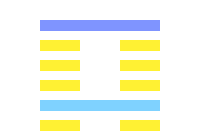
4.1.3.4.5.6 (4 > 43) - THE MĂNG HEXAGRAM
- 1. The first line, divided, (has respect to) the dispelling of ignorance. It will be advantageous to use punishment (for that purpose), and to remove the shackles (from the mind). But going on in that way (of punishment) will give occasion for regret.
- 3. The third line, divided, (seems to say) that one should not marry a woman whose emblem it might be, for that, when she sees a man of wealth, she will not keep her person from him, and in no wise will advantage come from her.
- 4. The fourth line, divided, (shows its subject as if) bound in chains of ignorance. There will be occasion for regret.
- 5. The fifth line, divided, shows its subject as a simple lad without experience. There will be good fortune.
- 6. In the topmost line, undivided, we see one smiting the ignorant (youth). But no advantage will come from doing him an injury. Advantage would come from warding off injury from him.
4.1.3.4.5.6 (4 > 43) - Questioning
One assesses the chances of reaching their goal.
Bing DeepL Google Yandex4.1.3.4.5.6 (4 > 43) - Questioning
One assesses the chances of reaching their goal.
Bing DeepL Google Yandex4.1.3.4.5.6 (4 > 43) - Meng, la stupidité juvénile
Meng : Intelligence non encore développée ; être non encore formé.
-
1. Pour dissiper l’ignorance, il faut user des châtiments.
Pour maintenir les règles en vigueur.
Il faut user d’avertissements et de punitions pour écarter toute cause de regret. -
3. N’épousez pas une fille si elle ne considère que l’or, si elle ne se possède pas elle-même ; cela ne serait pas heureux.
Ce ne serait point agir convenablement.
C’est-à-dire une fille ayant la qualité dont il s’agit n’est pas à épouser. - 4. L’ignorance pauvre et abandonnée est chose funeste. L’abandon, l’isolement tient éloignée la possession de la vérité.
-
5. L’ignorant, tout jeune encore, peut arriver à bien (être instruit).
Le bien de son état est la docilité, la douceur. - 6. Si l’on châtie l’ignorant en le formant, on ne doit point lui faire de tort, mais au contraire l’en préserver.
4.1.3.4.5.6 (4 > 43) - Interroger
On évalue les chances d'atteindre son but.
Bing DeepL Google Yandex4.1.3.4.5.6 (4 > 43) - Tanácskérés
- 1. Megmutatni a tanulónak a határokat amiken nem léphet túl, majd bizalmat adni neki.
- 3. Nem engedhet a fiatalabbak türelmetlenségének.
- 4. Ha valaki egyedül tanul, ez az ő döntése.
- 5. Nem hagyja abba a kérdezést.
- 6. Elutasítani akik átlépik a határokat.
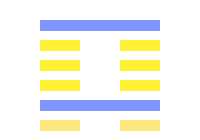
4.2.3.4.5.6 (4 > 31) - THE MĂNG HEXAGRAM
- 2. The second line, undivided, (shows its subject) exercising forbearance with the ignorant, in which there will be good fortune; and admitting (even the goodness of women, which will also be fortunate. (He may be described also as) a son able to (sustain the burden of) his family.
- 3. The third line, divided, (seems to say) that one should not marry a woman whose emblem it might be, for that, when she sees a man of wealth, she will not keep her person from him, and in no wise will advantage come from her.
- 4. The fourth line, divided, (shows its subject as if) bound in chains of ignorance. There will be occasion for regret.
- 5. The fifth line, divided, shows its subject as a simple lad without experience. There will be good fortune.
- 6. In the topmost line, undivided, we see one smiting the ignorant (youth). But no advantage will come from doing him an injury. Advantage would come from warding off injury from him.
4.2.3.4.5.6 (4 > 31) - Questioning
One raises a question that interests those who dared not to ask it.
Bing DeepL Google Yandex4.2.3.4.5.6 (4 > 31) - Questioning
One raises a question that interests those who dared not to ask it.
Bing DeepL Google Yandex4.2.3.4.5.6 (4 > 31) - Meng, la stupidité juvénile
Meng : Intelligence non encore développée ; être non encore formé.
-
2. Il est bien de se préoccuper de l’ignorant et de soutenir la jeune fille. Ainsi, ils pourront triompher de leur ignorance.
L’enfant fait durer la famille ; il faut en avoir soin.
Le fort et le faible doivent s’entraider. -
3. N’épousez pas une fille si elle ne considère que l’or, si elle ne se possède pas elle-même ; cela ne serait pas heureux.
Ce ne serait point agir convenablement.
C’est-à-dire une fille ayant la qualité dont il s’agit n’est pas à épouser. - 4. L’ignorance pauvre et abandonnée est chose funeste. L’abandon, l’isolement tient éloignée la possession de la vérité.
-
5. L’ignorant, tout jeune encore, peut arriver à bien (être instruit).
Le bien de son état est la docilité, la douceur. - 6. Si l’on châtie l’ignorant en le formant, on ne doit point lui faire de tort, mais au contraire l’en préserver.
4.2.3.4.5.6 (4 > 31) - Interroger
On soulève une question qui intéresse ceux qui n'ont pas osé la poser.
Bing DeepL Google Yandex4.2.3.4.5.6 (4 > 31) - Tanácskérés
- 2. Ha valaki barátságos és bizalmas tanár, bíznak benne.
- 3. Nem engedhet a fiatalabbak türelmetlenségének.
- 4. Ha valaki egyedül tanul, ez az ő döntése.
- 5. Nem hagyja abba a kérdezést.
- 6. Elutasítani akik átlépik a határokat.
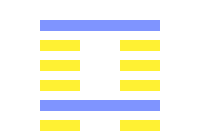
4.1.2.3.4.5.6 (4 > 49) - THE MĂNG HEXAGRAM
- 1. The first line, divided, (has respect to) the dispelling of ignorance. It will be advantageous to use punishment (for that purpose), and to remove the shackles (from the mind). But going on in that way (of punishment) will give occasion for regret.
- 2. The second line, undivided, (shows its subject) exercising forbearance with the ignorant, in which there will be good fortune; and admitting (even the goodness of women, which will also be fortunate. (He may be described also as) a son able to (sustain the burden of) his family.
- 3. The third line, divided, (seems to say) that one should not marry a woman whose emblem it might be, for that, when she sees a man of wealth, she will not keep her person from him, and in no wise will advantage come from her.
- 4. The fourth line, divided, (shows its subject as if) bound in chains of ignorance. There will be occasion for regret.
- 5. The fifth line, divided, shows its subject as a simple lad without experience. There will be good fortune.
- 6. In the topmost line, undivided, we see one smiting the ignorant (youth). But no advantage will come from doing him an injury. Advantage would come from warding off injury from him.
4.1.2.3.4.5.6 (4 > 49) - Questioning
One wants to use items that others do not want to return.
Bing DeepL Google Yandex4.1.2.3.4.5.6 (4 > 49) - Questioning
One wants to use items that others do not want to return.
Bing DeepL Google Yandex4.1.2.3.4.5.6 (4 > 49) - Meng, la stupidité juvénile
Meng : Intelligence non encore développée ; être non encore formé.
-
1. Pour dissiper l’ignorance, il faut user des châtiments.
Pour maintenir les règles en vigueur.
Il faut user d’avertissements et de punitions pour écarter toute cause de regret. -
2. Il est bien de se préoccuper de l’ignorant et de soutenir la jeune fille. Ainsi, ils pourront triompher de leur ignorance.
L’enfant fait durer la famille ; il faut en avoir soin.
Le fort et le faible doivent s’entraider. -
3. N’épousez pas une fille si elle ne considère que l’or, si elle ne se possède pas elle-même ; cela ne serait pas heureux.
Ce ne serait point agir convenablement.
C’est-à-dire une fille ayant la qualité dont il s’agit n’est pas à épouser. - 4. L’ignorance pauvre et abandonnée est chose funeste. L’abandon, l’isolement tient éloignée la possession de la vérité.
-
5. L’ignorant, tout jeune encore, peut arriver à bien (être instruit).
Le bien de son état est la docilité, la douceur. - 6. Si l’on châtie l’ignorant en le formant, on ne doit point lui faire de tort, mais au contraire l’en préserver.
4.1.2.3.4.5.6 (4 > 49) - Interroger
On souhaite utiliser des objets que les autres ne veulent pas rendre.
Bing DeepL Google Yandex4.1.2.3.4.5.6 (4 > 49) - Tanácskérés
- 1. Megmutatni a tanulónak a határokat amiken nem léphet túl, majd bizalmat adni neki.
- 2. Ha valaki barátságos és bizalmas tanár, bíznak benne.
- 3. Nem engedhet a fiatalabbak türelmetlenségének.
- 4. Ha valaki egyedül tanul, ez az ő döntése.
- 5. Nem hagyja abba a kérdezést.
- 6. Elutasítani akik átlépik a határokat.

